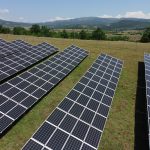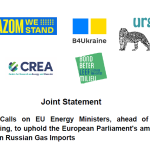Brussels, 21 October 2025, The general COP30 negotiating position adopted today by EU Environment Ministers offers some overdue signals, including the need to transition away from fossil fuels and accelerate clean energy roll-out. These signals should not be confused as action though. With climate impacts worsening and fossil fuel interests undermining progress, the EU cannot afford half-measures. Today’s conclusions make up just one part of the EU’s COP30 package, the real test lies in the decisions still to come.
Phasing out Fossil Fuels
CAN Europe welcomes the inclusion of key international benchmarks in today’s conclusions, and the explicit reference to transitioning away from fossil fuels. These positions are essential and overdue, and send a message that global energy transformation must accelerate in this decade.
Conclusions from the Ministerial meeting, however, fail to confront the root of the problem: continued fossil fuel expansion. The conclusion contained no reference to phasing out fossil fuel extraction, no end-date for fossil fuel subsidies, and no plan to cut methane emissions. Without these elements, the EU’s commitment to 1.5°C-aligned pathways remains incomplete.
‘EU Environment Ministers today offer helpful signals ahead of COP30, but stop short of great ambition,’ said Chiara Martinelli, Director at CAN Europe. ‘We cannot afford more ambiguity. There is no space for new fossil fuel projects, subsidies must end, and methane usage must be cut fast. These gaps weaken the EU’s push for meaningful outcomes at COP30.’
Just Transition
EU Ministers’ reflections today show a growing awareness of the need for just transition to be embedded across all aspects of climate action. CAN Europe applauds therefore references to people-centred, inclusive approaches and support for the ongoing Just Transition Work Programme under the UNFCCC.
The failure to explicitly endorse a dedicated International Just Transition mechanism by Ministers today, however, is quite the shortcoming. Without concrete institutional support, the shift away from fossil fuels will not be fair, fast, or global. Without strong financial commitments to support heavily affected countries in adapting to climate impacts, support is just words. Support for climate adaptation and a just transition are so much more than a necessity, human and ecological survival depends on it.
2040 Target and NDC Still Missing
Today’s Council conclusions are only one of the two cards that the EU must play ahead of COP30. The second, and drastically overdue, is of course the EU’s Nationally Determined Contribution (NDC). CAN Europe’s view is that the domestic 2035 NDC target must be derived from an ambitious 2040 target, and not disattached in any way. It is critical that the EU demonstrates its commitment to the Paris Agreement by agreeing on targets that are science and equity-aligned.
‘The EU’s Nationally Determined Contribution must reflect fair, science-based ambition to meet the 1.5°C goal’ said Sven Harmeling, Head of Climate at CAN Europe. ‘With escalating climate impacts and the EU’s own costs of inaction mounting, adopting a 2040 target and a robust 2035 NDC ahead of COP30 is not only necessary, it’s in the EU’s own socio-economic interest’.
In CAN Europe’s view, the EU should aim for climate neutrality already by 2040. CAN Europe also recognises and supports the growing calls of many scientists, businesses, investors, cities and regions, as key implementers of climate action, for the EU to adopt a 2040 target of at least 90% and a 2035 NDC of at least 72.5% domestic emission reductions. This would be a strong signal to investors that the EU is determined on a just climate transition.
ENDS
Read more:
- CAN Europe’s Recommendations for the Environment (ENV) Council Conclusions ahead of COP30
- CAN Europe’s Key Demands for COP30
- Join the CAN Europe COP30 mailing list for journalists – and follow our COP30 WhatsApp broadcast group to receive short term tips, reactions and invitations to press huddles on the ground.



